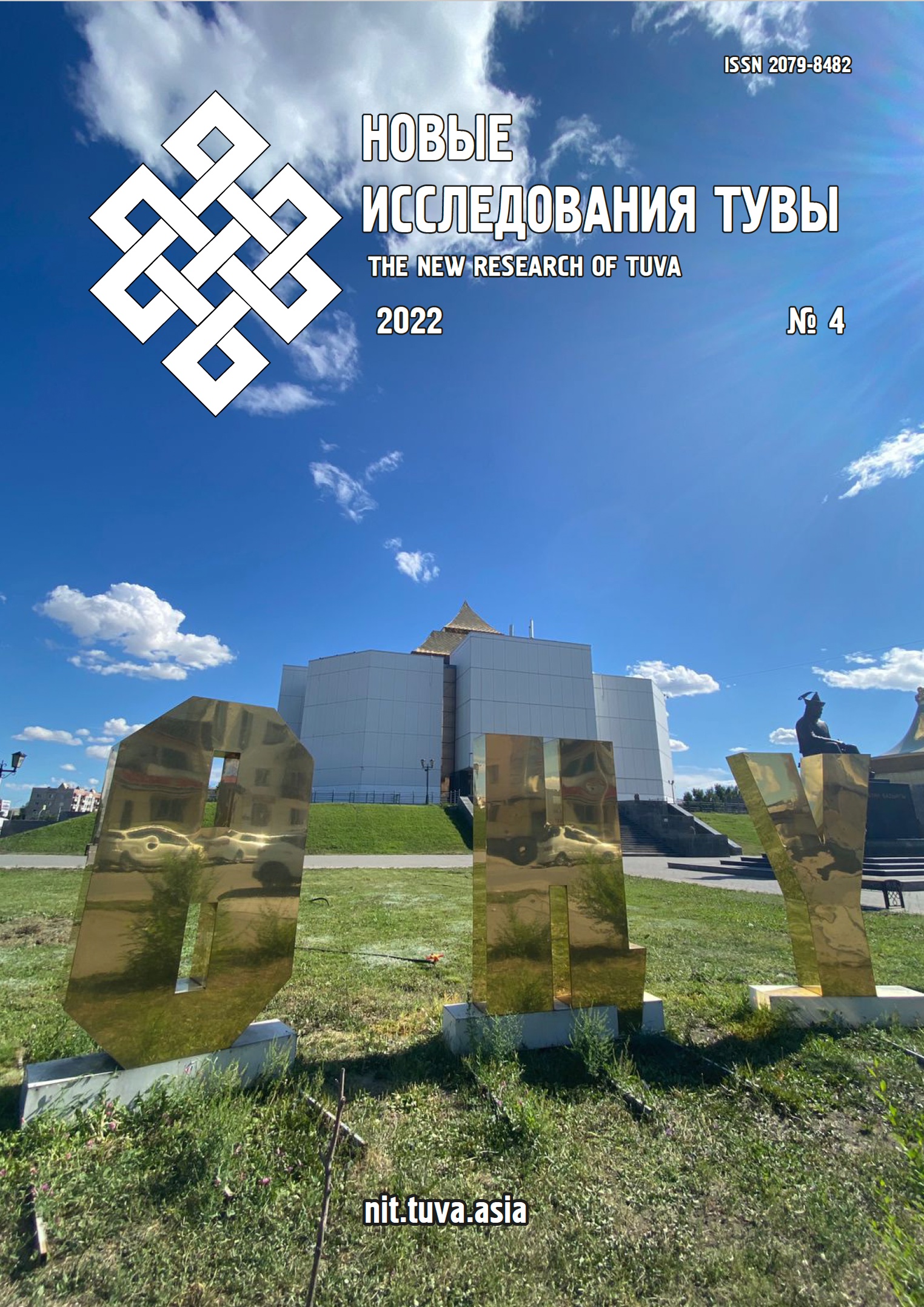The role of social entrepreneurship in the human development of the Republic of Tuva
DOI:
https://doi.org/10.25178/nit.2022.4.15Keywords:
social entrepreneurship; project activities; human development; Republic of Tuva; Tuva; non-profit organization; Presidential Grant FoundationAbstract
The article analyzes the role of social entrepreneurship in the human development of the Republic of Tuva. The analysis is based on data for 2017–2022 taken from the website of the Presidential Grant Foundation that supports NPOs. A modified J. A. Kelly’s repertory grid technique was applied.
The activity area “Support of Projects in the Field of Science, Education and Enlightenment” holds the top position in terms of resources attracted to the region. “Environmental and Animal Protection” is the second, and “Protection of Citizens’ Health, Promotion of a Healthy Lifestyle” is the third. Together, they accounted for 51 per cent of all funds raised. With the help of such projects, NPOs in Tuva work with different social groups in a targeted way, including socially vulnerable categories of people, involving fathers, students of secondary specialized educational institutions, the elderly, etc. Social entrepreneurs of the region reveal pressing issues and offer both traditional and innovative solutions. Their successful implementation will be useful to other regions of the country. Some social entrepreneurs have already created unique products: the Uriankhai and Tuvan Encyclopedia (TROO “The World of the Tuvans”) and an electronic archive of rare and historical issues of printed publications of the Republic of Tuva (Tuvan Library Association). They have become important resources not only for the residents of Tuva, but also for all Russian citizens.
References
Abulkhanova, K. A. (2002) Sotsial'noe myshlenie lichnosti [Social thinking of the individual]. In: Sovremennaia psikhologiia: sostoianie i perspektivy issledovanii [Modern psychology: State and prospects of research] : The research conference dedicated to the 30th anniversary of the Institute of Psychology of the Russian Academy of Sciences and the 75th anniversary of the birth of B. F. Lomov. Moscow, January 28–29, 2002 / ed. by K. A. Abulkhanova, M. I. Volovikov and A. L. Zhuravlev. Moscow, Institute of Psychology RAS. 288 p. Pp. 88–103. (In Russ.).
Abushenko, V. L. (2010) Tipologizatsiia [Typologization]. In: Noveishii sotsiologicheskii slovar' [The latest sociological dictionary] / comp. by A. A. Gritsanov et al. Minsk, Knizhnyi dom. 1312 p. Pp. 1125. (In Russ.).
Bederson, V. D. and Semenov, A. V. (2020) Politicheskie osnovaniia gosudarstvennoi podderzhki nekommercheskogo sektora: analiz raspredeleniia prezidentskikh grantov v Rossii [The political foundations of state support for the nonprofit Sector: An analysis of the distribution of “presidential grants” in Russia]. Mir Rossii, vol. 29, no. 3, pp. 96–120. (In Russ.). DOI: https://doi.org/10.17323/1811-038X-2020-29-3-96-120
Bourdieu, P. (1998) Struktura, gabitus, praktika [Structure, habitus, practice]. Zhurnal sotsiologii i sotsial'noi antropologii, vol. 1, no. 2, pp. 44–59. (In Russ.).
Vetrova, E. A. and Borodina, M. I. (2016) Sotsial'noe predprinimatel'stvo kak faktor razvitiia obshchestva [Social entrepreneurship as a factor in the development of society]. Sotsial'no-ekonomicheskie iavleniia i protsessy, no. 12, pp. 18–22. (In Russ.).
Giddens, A. (2002) Novye pravila sotsiologicheskogo metoda [New rules of the sociological method]. In: Teoreticheskaia sotsiologiia [Theoretical sociology] : An anthology : in 2 parts / transl., comp. and ed. by S. P. Bankovskaya. Moscow, Knizhnyi dom “Universitet”. Part 2. 424 p. Pp. 281–318. (In Russ.).
Dontsov, A. I. and Emelyanova, T. P. (1984) Kontseptsiia sotsial'nykh predstavlenii v sovremennoi frantsuzskoi psikhologii [The concept of social representations in modern French psychology]. Voprosy psikhologii, no. 1, pp. 147–152. (In Russ.).
Zhokhova, V. P. (2015) Sotsial'noe predprinimatel'stvo: tipologiia vidov [Social entrepreneurship: Typology of types]. Izvestiia Dal'nevostochnogo federal'nogo universiteta. Ekonomika i upravlenie, no. 4, pp. 89–105. (In Russ.).
Inglehart, R. and Welzel, С. (2011) Modernizatsiia, kul'turnye izmeneniia i demokratiia: Posledovatel'nost' chelovecheskogo razvitiia [Modernization, cultural change, and democracy: The human development sequence]. Moscow, Novoe izdatel'stvo. 464 p. (In Russ.).
Kelly, G. A. (2000) Teoriia lichnosti. Psikhologiia lichnykh konstruktov [A theory of personality: The psychology of personal constructs] / transl. by A. A. Alekseev. St. Petersburg, Rech'. 249 p. (In Russ.).
Kniazeva, E. N. (2010) Konstruirovanie budushchego [Designing the future]. Ekonomicheskie strategii, no. 4, pp. 88–97. (In Russ.).
Kobyl'nikov, V. P. (2019) Aktual'nye problemy finansovoi podderzhki nekommercheskogo sektora regiona (na primere predostavleniia «prezidentskikh grantov») [Topical issues of financial support of the non-profit sector in the region (on the example of “presidential grants”)]. Problems of Territory's Development, no. 1 (99), pp. 107–120. (In Russ.). DOI: https://doi.org/10.15838/ptd.2019.1.99.7
Lavrenyuk-Isaeva, N. M. (2021) Novye riski sotsial'nykh predprinimatelei v usloviiakh pandemii SOVID-19 [New risks of social entrepreneurs in the context of the COVID-19 pandemic]. Sotsial'naia politika i sotsiologiia, vol. 20, no. 1, pp. 116–124. (In Russ.). DOI: https://doi.org/10.17922/2071-3665-2021-20-1-116-124
Lavrenyuk, N. M. and Tikhonova, A. S. (2020) Ekspertiza pasporta natsional'noi programmy «Tsifrovaia ekonomika Rossiiskoi Federatsii» po chek-listu sotsial'noi sistemnoi inzhenerii [Examination of the passport of the national program “Digital economy of the Russian Federation” on the checklist of social system engineering]. Siberian Socium, vol. 4, no. 2 (12), pp. 8–20. (In Russ.). DOI: https://doi.org/10.21684/2587-8484-2020-4-2-8-20
Lukov, V. A. (2016) Sotsial'noe proektirovanie [Social design]. Moscow, Flinta. 240 p. (In Russ.).
Moscovici, S. (1992) Ot kollektivnykh predstavlenii k sotsial'nym (k istorii odnogo poniatiia) [From collective ideas to social ones (to the history of one concept)]. Voprosy sotsiologii, vol. 1, no. 2, pp. 83–95. (In Russ.).
Moscovici, S. (1995) Sotsial'nye predstavleniia: istoricheskii vzgliad [Social representations: A historical view]. Psikhologicheskii zhurnal, vol. 16, no. 2, pp. 3–14. (In Russ.).
Moskovskaia, A. A., Berendiaev, A. A. and Moskvina, A. Yu. (2017) Mezhdu sotsial'nym i ekonomicheskim blagom: konflikt proektov legitimatsii sotsial'nogo predprinimatel'stva v Rossii [Between social and economic benefits: The conflict of projects for social entrepreneurship legitimation in Russia]. Monitoring obshchestvennogo mneniia: ekonomicheskie i sotsial'nye peremeny, no. 6 (142), pp. 31–51. (In Russ.).
Nikulina, I. Yu. (2018) Rol' sotsial'nogo predprinimatel'stva v sotsial'no-ekonomicheskom razvitii territorii [The role of social entrepreneurship in socio-ecomomic development of the territory]. Vestnik ekspertnogo soveta, no. 4 (15), pp. 36–43. (In Russ.).
Orlov, P. A. (2020) Iuzhnoural'skie NKO v konkursakh fonda prezidentskikh grantov [South Ural NPOs in competitions of the Presidential Grant Foundation]. In: XXII Ural'skie sotsiologicheskie chteniia. Natsional'nye proekty i sotsial'no-ekonomicheskoe razvitie Ural'skogo regiona [22nd Ural Sociological Readings. National projects and socioeconomic development of the Ural region] : Proceedings of the All-Russian research-to-practice conference (Yekaterinburg, March 17–18, 2020) / ed. by Yu. R. Vishnevskii and M. V. Pevnaya. Ekaterinburg, Publishing House of the Ural University. 512 p. Pp. 39–43. (In Russ.).
Parsons, T. (1998) Sistema sovremennykh obshchestv [The system of modern societies] / transl. from Engl. by L. A. Sedov and A. D. Kovalev; ed. by M. S. Kovaleva. Moscow, Aspekt-Press. 269 p. (In Russ.).
Prognoznoe sotsial'noe proektirovanie: teoretiko-metodologicheskie i metodicheskie problemy [Predictive social design: Theoretical, methodological and systematic problems] (1994) / ed. by T. M. Dridze. 2nd ed. Moscow, Nauka. 375 p. (In Russ.).
Reznik, Yu. M. (1994) Sotsial'naia inzheneriia: predmetnaia oblast' i granitsy primeneniia [Social engineering: Subject area and application boundaries]. Sotsiologicheskie issledovaniia, no. 2, pp. 87–96. (In Russ.).
Ritzer, G. (2002) Sovremennye sotsiologicheskie teorii [Modern sociological theory] / transl. from Engl. by A. Boikov and A. Lisitsyna. 5th ed. St. Petersburg, Piter. 688 p. (In Russ.).
Santos, F. (2012) Pozitivnaia teoriia sotsial'nogo predprinimatel'stva [A positive theory of social entrepreneurship]. Zhurnal delovoi etiki, vol. 111, pp. 335–351. (In Russ.).
Sattarov, T., Khairullina, Нu., and Garipova, R. (2021) Rol' sotsial'nogo predprinimatel'stva v sisteme okazaniia uslug naseleniiu [The role of social entrepreneurship in the system of rendering services to the population]. Elektronnyi ekonomicheskii vestnik, no. 1, pp. 42–48. (In Russ.).
Sorokin, P. (2006) Sotsial'naia i kul'turnaia dinamika [Social and cultural dynamics] / transl. from Engl. by V. V. Sapov. Moscow, Astrel'. 1176 p. (In Russ.).
Haken, H. (2006) Samoorganizuiushcheesia obshchestvo [Self-organizing society]. In: Budushchee Rossii v zerkale sinergetiki [The future of Russia in the mirror of synergetics] / G. G. Malinetskii et al., ed. by G. G. Malinetskii. Moscow, URSS. 269 p. Pp. 194–209. (In Russ.).
Khachaturian, K. S. (2012) Sotsial'nye investitsii i ikh rol' v intellektualizatsii chelovecheskogo kapitala [Social investments and their role in the intellectualization of human capital]. Vestnik Moskovskogo universiteta imeni S. Iu. Vitte. Seriia 1: Ekonomika i upravlenie, no. 1, pp. 111–116. (In Russ.).
Chelovecheskii potentsial kak kriticheskii resurs Rossii [Human potential as a critical resource of Russia] (2007) / ed. by B. G. Yudin. Moscow, Institute of Philosophy of the RAS. 175 p. (In Russ.).
Yaznevich, M. V. (2010) Repertuarnye reshetki [Repertory grids]. In: Noveishii sotsiologicheskii slovar' [The latest sociological dictionary] / comp. by A. A. Gritsanov et al. Minsk, Knizhnyi dom. 1312 p. Pp. 851–855. (In Russ.).
Abric, J.-C., (2003) L’analyse structurale des représentations sociales. In: Les methods des sciences humaines / sous la dir. S. Moscovici, F. Buschini. Paris, Presses Universitaires de France. 472 p. Pp. 375–392.
Alexander, J. C. (1982) Theoretical logic in sociology : in 4 vols. Berkeley, University of California Press. Vol. 1: Positivism, presuppositions, and current controversies. xvi, 234 p.
Becker, H. (1968) Through values to social interpretation. New York, Greenwood Press. xvill, 341 p.
Doise, W. (2001) Human rights studied as normative social representations. In: Representations of the social: Bridging theoretical traditions / ed. by K. Deaux and G. Philogène. Oxford, Blackwell Publishers. xii, 362 p. Pp. 96–112.
Gurvitch, G. (1964) The spectrum of social time. Dortrecht, Neth., D. Reidel. xxvi, 152 p.
Habermas, J. (1984) The theory of communicative action : in 2 vols. Boston, Beacon Press. Vol. 1: Reason and the rationalization of society. xlii; 465 p.
Habermas, J. (1985) The theory of communicative action: in 2 vols. Boston, Beacon Press. Vol. 2: Lifeworld and system: A critique of functionalist reason. 464 p.
Haugh, H. (2007) New strategies for a sustainable society: The growing contribution of social entrepreneurship. Business Ethics Quarterly, vol. 17, issue 4, pp. 743–749.
Jodelet, D. (1991) Représentation sociale. In: Grand dictionnaire de la psychologie / ed. by H. Bloch. Paris, Larousse. 1062 p. Pp. 668–672.
Sen, A. K. (1985) Commodities and capabilities. Oxford, Oxford University Press. 130 p.
Streeten, P. (1994) Human development: Means and ends. American Economic Review, American Economic Association, vol. 84(2), pp. 232–237.
Weber, M. (1988) Über einige Kategorien der verstehenden Soziologie. In: Weber M. Gesammelte Aufsätze zur Wissenschaftslehre. 7. Aufl. Tübingen, Mohr (Siebeck). 579 p. Pp. 427–474.
Published
How to Cite
For citation:
Lavrenyuk-Isayeva N. M. Rol’ sotsial’nogo predprinimatel’stva v chelovecheskom razvitii Respubliki Tyva [The role of social entrepreneurship in the human development of the Republic of Tuva]. New Research of Tuva, 2022, no. 4, pp. 190‑212. (In Russ.). DOI: https://doi.org/10.25178/nit.2022.4.15
Issue
Section

This work is licensed under a Creative Commons Attribution-NonCommercial 4.0 International License.

Author(s) license holder(s) grant rights for their work to the journal (grantee of a license) under the simple non-exclusive open license in accordance with Art. 1286.1 «Open license for a research work, work of literature or fine arts», Civil Code of the Russian Federation.
New Research of Tuva publishes articles under the Creative Commons Attribution-NonCommercial license (CC BY-NC).
Since it is an open license, author(s) reserve the right to upload the article to their institutional repository, submit it to another journal (if it allows republications), or republish it on their own website (in full, or in part).
However, several conditions apply here:
a) The republished version must always contain the name(s) and affiliation(s) of the author(s), the original title and the hyperlink to the original version on the New Research of Tuva website;
b) It must be in open access, free of charge, and no category of readers must be in any way whatsoever advantaged over general readership.
c) should the contribution be submitted elsewhere by its author(s) without substantial modification (30% or more of original text unchanged), the body of the article should contain a disclaimer that the original version was published in New Research of Tuva (with a link to the respective page)
The CC-BY-NC is a non-revocable license which applies worldwide and lasts for the duration of the work’s copyright.









